NBA players with dreads: Who has the best locks in the league right now?
NBA
If you were a fan of the Detroit Pistons during the late '80s and early '90s, you indeed had a deep affection for the "Motor City Bad Boys." The team's aggressive playing style and physicality made them a force to be reckoned with. They played a significant role in bringing down the mighty Lakers and Celtics teams that dominated the NBA in the 1980s.
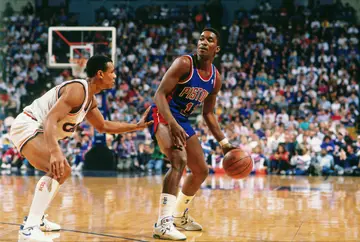
During their reign, the Detroit Pistons dominated the NBA, earning them the nickname "Bad Boys." Their unique play style and physicality had a lasting impact on the league. They hold a prominent place in the franchise's history as one of the most influential teams ever to take the court.
They were the Detroit Pistons basketball team which played during the late 80s. The members introduced a new style of play characterized by a strong emphasis on defence, rebounding, and physical toughness. They transformed the game of basketball from a free-flowing, artistic style to a more rugged and physical approach.
NBA players with dreads: Who has the best locks in the league right now?
NBA
The team earned the nickname "Bad Boy Pistons" for a specific reason and gained a reputation for their aggressiveness. This occurred during an era when other prominent teams, such as Magic Johnson's Lakers, Larry Bird's Celtics, and Michael Jordan's Bulls, were dominating the NBA. However, Isiah Thomas' Bad Boy Pistons disrupted this cycle of dominance by achieving back-to-back championship titles.
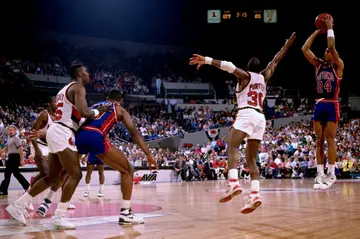
During the 1987-88 NBA season, the Detroit Pistons emerged as the champions of the Eastern Conference by defeating the Boston Celtics in a 4-2 series in the Eastern Conference Finals. However, their journey ended in the NBA Finals as the Los Angeles Lakers defeated them in a close 3-4 series.
The following season, in 1988-89, the Pistons showcased their dominance by securing the championship title. They achieved an outstanding regular season record of 63-19, the best in franchise history up to that point. In the NBA Finals, they again faced the Lakers and emerged victorious with a 4-0 series sweep. Joe Dumars played a crucial role and was named the NBA Finals MVP.
Best comeback in NBA history: Ranking the 10 biggest comebacks in basketball
NBA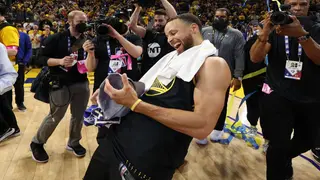
This marked a significant turning point as it ended the era of championship dominance by the Celtics and Lakers, who had collectively won eight titles from 1980 to 1988. The Detroit Pistons continued their success by winning the championship title again in the 1989-90 season, securing their second consecutive title. Isiah Thomas was instrumental in leading the team to victory and clinching the NBA Finals title.
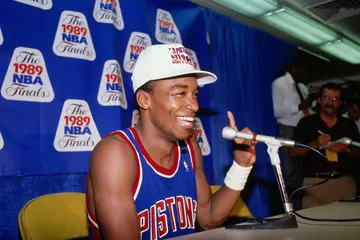
Let us consider their performances in two NBA championship playoff runs. In the 1988-89 season, Detroit had an outstanding 15-2 record in the playoffs, defeating the Celtics, Bucks, Bulls, and Lakers. During their repeat run, the Pistons achieved a solid 15-5 record, overcoming challenges from the Pacers, Knicks, Bulls, and Blazers.
It is important to recognise that the Detroit Pistons had more than just physicality in their arsenal—they also possessed significant skill. This is a misconception that often surrounds the team. The championship roster of the Bad Boy Pistons in the 1988-89 season featured five players who averaged at least 13 points per game: Isiah Thomas, Bill Laimbeer, Joe Dumars, and Vinnie Johnson.
Ranking! Who are the 10 best basketball general managers in the NBA right now?
NBA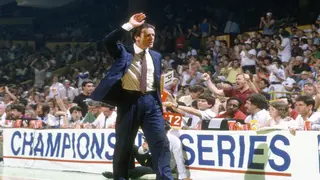
In addition to their scoring prowess, the Pistons had the contributions of Dennis Rodman, who averaged nine points and 9.8 rebounds per game. The team also had a deep bench with players like James Edwards and John Salley, who played vital roles.
The core All-Star players of the Bad Boy Pistons consisted of Bill Laimbeer, Isiah Thomas, Rick Mahorn, Dennis Rodman, John Salley, and Joe Dumars. While other players made important contributions off the bench, these players were primarily responsible for the team's physical reputation.
Each of them brought their own brand of toughness and a winning mentality. Collectively, they appeared invincible on many occasions. Rodman, Laimbeer, and Thomas, in particular, became the faces of the "Bad Boys" due to their style of play and impact on the team.
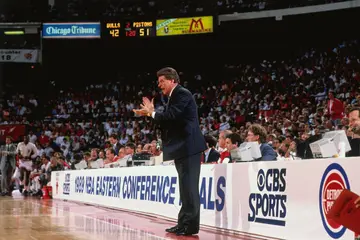
The team was led by Chuck Daly. He is one of the most notable coaches in the franchise's illustrious history. His coaching abilities were exceptional, as he excelled at motivating his players and getting them to commit to his vision and objectives fully.
NBA's best selling jerseys: Which are the 10 most selling jerseys in basketball?
NBA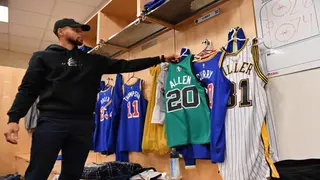
After adopting the moniker of the "Bad Boys," the Detroit Pistons achieved NBA championship titles in their first two seasons. However, the aura of their black-and-silver uniforms and the associated label began to fade earlier than anticipated. Michael Jordan and his Chicago Bulls played a significant role.
When the Bulls ultimately defeated Isiah Thomas and the Pistons in the playoffs in 1991, it became evident that an era was closing. This defeat marked a symbolic shift in power, signalling the end of the Pistons' dominance and the emergence of the Bulls as a formidable force in the NBA.
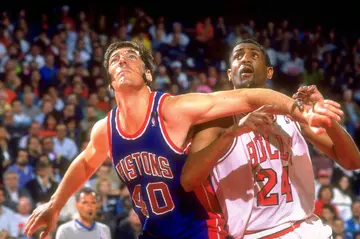
The Bad Boy Pistons era, known for its intense and physical style of play, was relatively short-lived, lasting less than four years. After their loss to the Bulls in 1991, a notable incident occurred when several Pistons players, led by Isiah Thomas, left the court without shaking hands. As a result of the team's reputation and Thomas' perceived involvement in physical play, he was controversially excluded from the renowned 1992 USA Basketball "Dream Team," widely regarded as the greatest basketball team ever assembled.
Who is the lowest-paid NBA player in the league right now?
NBA
Following their sweep by the Bulls, the Pistons made changes during the off-season, trading James Edwards and waiving Vinnie Johnson. In the 1991-92 season, they finished with a 48-34 record but were defeated by the New York Knicks in the first round of the 1992 NBA playoffs.
After that season head coach Chuck Daly resigned after that season, and the Pistons entered a transitional period. Key players were traded (such as Salley and Rodman) or retired (Laimbeer in 1993 and Thomas in 1994). Their performance hit a low point in the 1993-94 season, finishing with a dismal 20-62 record.
Despite the controversies and subsequent decline, the Bad Boy Pistons' achievements are never understated. Winning back-to-back NBA titles is a remarkable accomplishment, and their era will always hold a significant place in the history of the NBA.
READ ALSO: Who is the best 6th man of all time in the NBA? The best off-the-bench player in NBA history
Revealed! 20 best NBA playoff players in the history of the game
NBA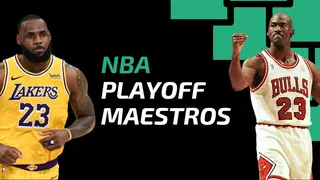
Sports Brief published an article about the best 6th man of all time. These great NBA players are not always given the spotlight that they deserve at all, possibly because they play supporting roles on their teams or because they are not starters.
The first player off the bench typically sets the tone for the remainder of the game, and the truly great ones tend to end the game strongly, impacting the end result. Click on the above link to read more!